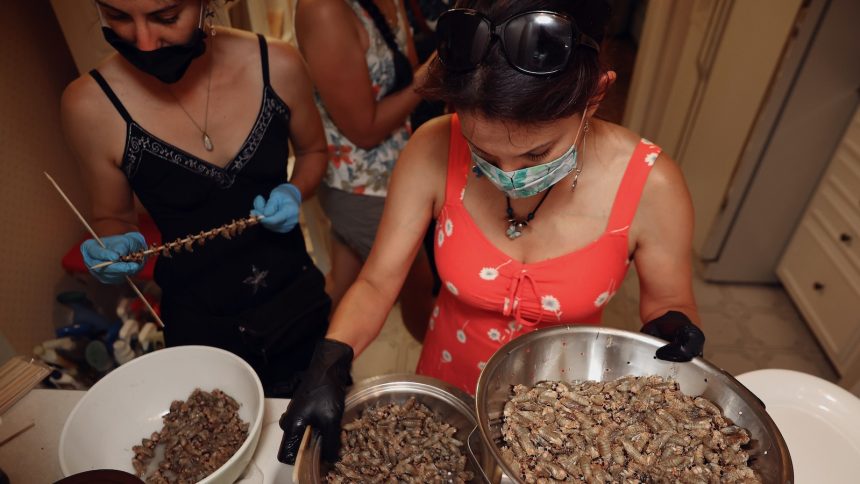When Cortni Borgerson envisions the trillions of periodical cicadas emerging from underground, she sees more than just flying insects searching for a mate. She sees a potential meal. Embracing the idea of consuming insects is a way to challenge colonialist beliefs that view eating bugs as “uncivilized.” Borgerson, an anthropologist at Montclair State University, is on a mission to shift perceptions surrounding insect consumption. She particularly enjoys cicadas, describing their texture as similar to peeled shrimp and their flavor as a cross between a chicken nugget and a sunflower seed. For those new to entomophagy, Borgerson suggests trying cicadas in tacos.
The fascination with edible insects is gaining momentum as this year’s cicada emergence approaches, with an array of recipes and culinary tributes celebrating the bugs. This interest aligns with a growing movement towards alternative proteins, driven by consumers seeking a more sustainable food system. Borgerson believes that insects offer a solution to the environmental impacts of traditional protein sources like beef while addressing food insecurity.
Despite being a common dietary choice for 30% of the global population, insect consumption remains largely unexplored in the United States. Attitudes towards eating bugs are often shaped by outdated stigmas, rooted in colonial influences. Julie Lesnik, an anthropologist at Wayne State University, highlights the cultural biases that perpetuate aversion to entomophagy. She attributes this to a history of labeling indigenous practices as “uncivilized” and the perpetuation of racialized ideologies.
Joseph Yoon, founder of Brooklyn Bugs and chef advocate for the United Nations International Fund for Agricultural Development, challenges misconceptions about insect consumption. He views insects as a sustainable solution rather than a last-resort option associated with poverty or impending disaster. Yoon advocates for collaboration to create innovative solutions for global food systems and combat misinformation that hinders progress in exploring insect protein as a viable option.
The potential for insects as a sustainable protein source has garnered attention worldwide, with startups focusing on utilizing insects in various forms. The market for insect-derived products is projected to grow significantly in the coming years, reflecting a shift towards more environmentally friendly food choices. Rachel Mazac, a sustainability researcher, emphasizes the efficiency of insect protein production compared to traditional livestock. She suggests that insects could play a significant role in reducing carbon footprints in the food industry.
While some researchers question the scalability and ethical considerations of insect farming, others like Jeffery Tomberlin advocate for exploring all options to address the climate crisis. He believes that diversifying protein sources is essential for sustainable food systems, urging a shift in consumer and policymaker perspectives to embrace insect consumption as a viable solution. By investing in research and development, insect protein could become a mainstream alternative to traditional meats. This shift would not only challenge long-standing prejudices but also pave the way for a more sustainable and diverse food future.





